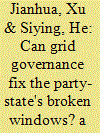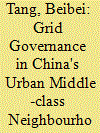| Srl | Item |
| 1 |
ID:
186945


|
|
|
|
|
| Summary/Abstract |
Grid governance has been developed by the Chinese party-state to collect intelligence at the grassroots level for the early pre-emption of what it defines as social instability. Using data collected from four months’ participant observation and extensive interviews with personnel who work in the grid governance system in what we call W Street, a location in a second-tier city in southern China, this paper examines how China's grid governance is used for stability maintenance and how in practice the system has become alienated from its original purpose of social control. We find that grid governance is achieved mainly through three mechanisms: intelligence gathering, case coordination and real-time reporting for stability maintenance. We further reveal that while grid governance provides an important infrastructural power for intelligence gathering, the realization of this power could be hindered by contradictory logics among different levels of government. This research not only provides empirical data on how China's grid governance works in practice but also calls for a rethinking of the capacity of China's stability maintenance regime.
|
|
|
|
|
|
|
|
|
|
|
|
|
|
|
|
| 2 |
ID:
173457


|
|
|
|
|
| Summary/Abstract |
This article examines the so-called “grid governance” scheme, a widely used grassroots governance strategy implemented in urban China in recent years. Drawing on data collected in multiple cities from 2011 to 2016, it analyses in what ways, and to what extent, the state employs the grid governance scheme to resolve neighbourhood conflicts and reinforce governance in Chinese urban middle-class neighbourhoods. The findings highlight complex interactions under the scheme among the residents, the state and market actors in neighbourhood governance, including the resident volunteers, residents’ social groups, residents’ committees and property management companies. By coopting middle-class resident volunteers, maximizing the existing political influence of the retired urban elites, and establishing Party organizations in middle-class residential communities, the grid governance scheme has become a major vehicle for resident mobilization and conflict resolution, and a key governance mechanism to reinforce the Party's leadership in middle-class neighbourhoods.
|
|
|
|
|
|
|
|
|
|
|
|
|
|
|
|